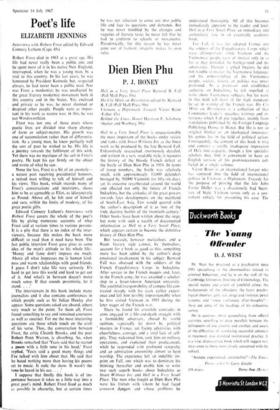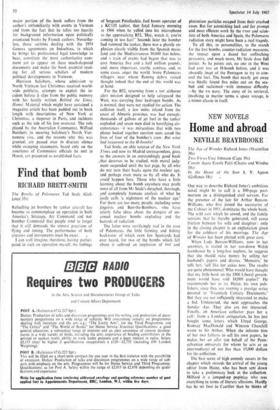Dien Bien Phu
P. .T. HONEY
Ho Chi Minh on Revolution edited by Bernard B. Fall (Pall Mall Press 50s) Vietnam, a Diplomatic Tragedy Victor Bator (Faber 42s) Behind the Lines, Hanoi Harrison E. Salisbury (Seeker and Warburg 30s) Hell in a Very Small Place is unquestionably the most important of the books under review and ranks with Street Without Joy as the finest work to be produced by the late Bernard Fall. Exhaustively researched, enormously detailed, and written in a very readable style, it recounts the history of the bloody French defeat at the battle of Dien Bien Phu in 1954. In terms of troop numbers, the battle was relatively small, with approximately 13,000 defenders besieged by 50,000 Vietminh for fifty-six days, yet its outcome reverberated around the world and affected not only the future of French Indochina, but the attitudes of the great powers towards later developments on the mainland of South-East Asia. Few would quarrel with the author's description of it as 'one of the truly decisive battles of the twentieth century.' Other books have been written about the siege, but none with such a wealth of documented information as Hell in a Very Small Place, which appears certain to become the definitive history of Dien Bien Phu.
But research, however meticulous, and a fluent literary style cannot, by themselves, account for a book as good as this; something more has been added by the author's deep emotional involvement in his subject. Bernard Fall was obsessed with the soldiers of the French Expeditionary. Corps in Indochina. After service in the French maquis and, later, in the French army, he w as awarded a scholar- ship to a lesser-known American university. The youthful irresponsibility of campus life con- trasted sharply with his stark earlier experi- ence and left him terribly impressionable when he first visited Vietnam in 1953 during the later stages of the French war.
There he found his erstwhile comrades in arms engaged in a life-and-death struggle with a formidable adversary, abused by world opinion, repeatedly let down by political masters in France, yet facing adversities with cheerfulness, courage, and a total lack of self- pity. They welcomed him, took him on military operations, and explained their predicament, while he responded with profound sympathy and an admiration amounting almost to hero worship. The experience left an indelible im- print on Fall, one which was to dominate his thinking thereafter and enable him to write two such superb books about Indochina as Street Without Joy and Hell in a Very Small Place. The men who fought at Dien Bien Phu were his friends with whom he had faced common dangers and whose problems he understood thoroughly. All of this becomes immediately apparent to the reader and lends Hell in a Very Small Place an immediacy and authenticity rare in an essentially academic book.
For Fall, it w as his adopted France and the soldiers of the F‘peditionary Corps which were all-important. while Vietnam and the Vietnamese people were of interest only in so far as they pros ided :he battleground and the adversaries. Though a gifted linguist, he did not trouble to master the Vietnamese language, and his understanding of the Vietnamese people, society. history or politics was never profound. As a professor and established authority on Indochina, he felt impelled, to write about Vietnamese subjects, but his work in this field fell short of the high standards he set in vs riling of the French war. Ho CI,' Minh on Revolution is a collection of that Communist leader's speeches, writings and in- terviews which Fall put together, mainly from translations published by the Foreign Language Publishing House in Hanoi. But Ho is not an original thinker or an ideological innovator; his genius lies in the field of political action. Consequently. the content of this book is trite and conveys totally inadequate impression of Ho's true capacity, though a few specialist scholars may find it convenient to have an English version of his pronouncements col- lected in a single volume.
Victor Bator is an international lawyer who has ventured into the field of international politics in Vietnam, a Diplomatic 7'ragedy for the purpose of proving that the late John Foster Dulles was a disastrously bad Secre- tary of State. Vietnam serves only as a con- venient vehicle for presenting his case. The
major portion of the book suffers from the author's unfamiliarity with events in Vietnam and from the fact that he relies too heavily for background information upon politically orientated books by French authors. Neverthe- less, those sections dealing with the 1954 Geneva agreements on Indochina, in which he brings his professional legal knowledge to bear, constitute the most authoritative com- ment yet to appear on these much-disputed documents and make the book essential read- ing for all serious scholars of modern political developments in Vietnam.
Harrison Salisbury, whose admission to North Vietnam last Christmas received world- wide publicity, attempts to exploit the in- cident before it slips from the public memory with his hastily written Behind the Lines, Hanoi. Material which might have sustained a magazine article has been padded out to book length with descriptions of New York at Christmas, a stopover in Paris, and incidents such as the tale of his lost overcoat. The role played by the Australian Communist, Wilfred Burchett, in securing Salisbury's North Viet- namese visa, and the reasons why this was granted, are passed over in discreet silence while sweeping statements, based only on the assertions of Communist officials he met in Hanoi, are presented as established facts.































 Previous page
Previous page